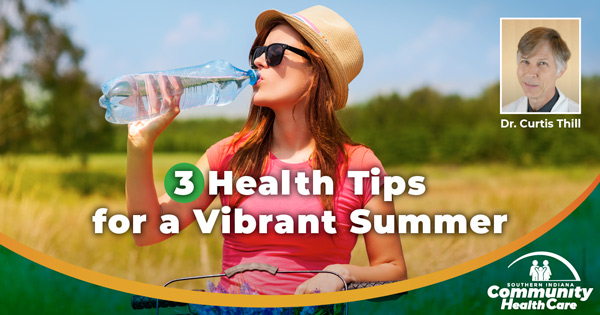Three Tips to Promote Summer Health

By Curtis Thill, M.D.
As Hoosiers reach midsummer, we see a number of common health issues in our clinics in Crawford and other counties. Read here how you can positively deal with these and enjoy your summertime.
Drink water every day and lots of it
We see a surprisingly high number of people who experience moderate dehydration. Everyone should try to drink between 100 to 120 ounces of water a day (four glasses), more if you’re working out or doing hard physical work. Your body takes a lot of water to work properly.
Have a headache or feeling a little fatigued? Is the fluid dark when you go to the bathroom? That’s a good sign that you may be a little behind in drinking water.
Get an early start on drinking your four glasses of water daily. Try drinking a glass of water right when you wake up. That will help you become fully awake, including increasing the activity of all of your vital organs.
Tired of drinking water? Up your water intake by eating and snacking on watermelon, strawberries, cucumbers and grapefruit – they all contain at least 90 percent water.
Healthy sun time vs. overexposure
During the warm summer months many of us fall into the category of “sun worshipers.” We like to be outside by the pool, in the garden, or being active and generally trying to get in a few rays.
The good news? Moderate sun exposure is generally very healthy. Sunlight promotes the production of Vitamin D, a critical vitamin that supports good bone health and helps prevent a variety of diseases. Being in the sun often boosts our mood and is good for our mental health.
But too much time in direct sunlight – especially in direct and intense ultraviolet light – can result in harm. On a cloudy day UV light can sneak up on us, especially when we don’t feel the heat from the infrared light of the sun. Too much UV exposure reaches your inner skin layers, producing a redness as blood flow increases. We get “burnt” when our skin has absorbed so much UV that skin cells are damaged or dying. That can be painful, even dangerous, as it can accelerate skin cancer and other issues.
Continued overexposure can make your skin age faster than normal and can cause eye damage, potentially leading to cataracts.
To counter these effects, use sunscreen to protect against excessive UV rays when you’re out working or having fun in the sun. If you want a tan, build it slowly. Wearing a hat or light protective clothing during the high UV times of the day (10 a.m. to 4 p.m.) can also help.
Boost your bone health
We typically don’t pay a lot of attention to bone health, until we break one. As noted above, moderate sun exposure helps generate bone-building Vitamin D. When we’re younger, we build bone mass. After age 30, we can start to see a decline in bone mass, so it’s important to stay active and ensure that we’re getting enough calcium in our diet.
We should also consider increasing our calcium and Vitamin D intake if we’re older than 70. Good sources of calcium include milk and cheese, broccoli, kale, and salmon. Apart from being in the sun, you can increase your Vitamin D by eating salmon (and other “oily” fish), mushrooms, eggs, and milk.
Summertime in Indiana is generally fun time. Take a few steps to ensure health for outdoor memory-making and good times!
A board-certified family physician, Dr. Curtis Thill has practiced medicine in the Crawford County region for more than 30 years.
